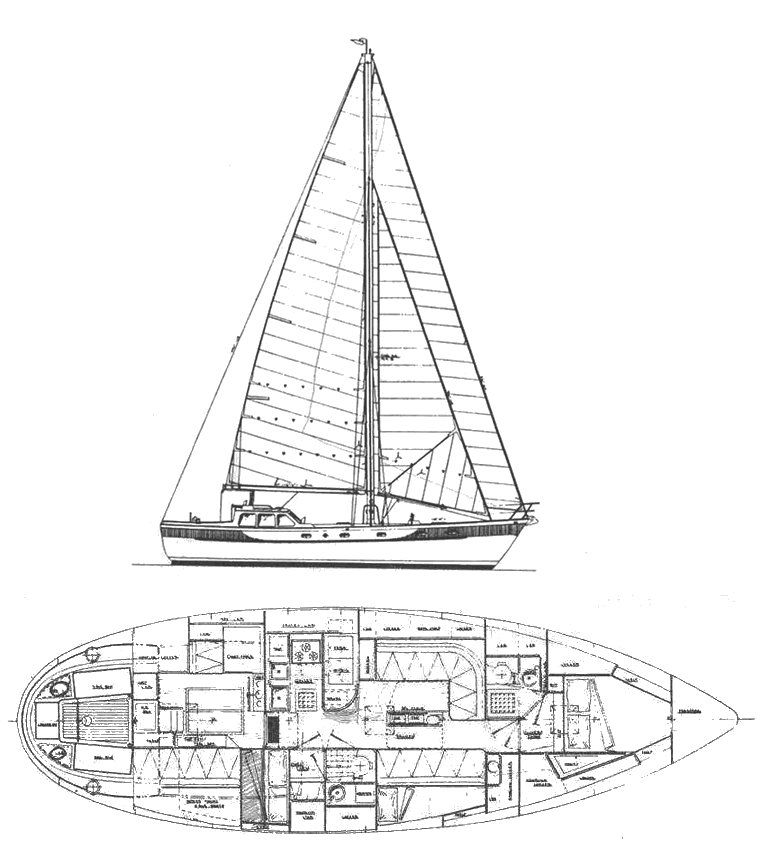The Oceanic 43, often also referred to as the Pan Oceanic 43, stands as a testament to the robust and seaworthy design philosophy championed by the celebrated naval architect Edward S. Brewer. Built by Pan Oceanic Marine, a company founded by Robert Pancoe, this model quickly established its reputation as a capable bluewater cruising yacht. With its solid fiberglass construction and traditional lines, the Oceanic 43 was conceived for serious offshore passages and comfortable extended living aboard, appealing to sailors who prioritize dependability and a secure motion in a seaway.
Oceanic 43 Information, Review, Specs

- Make
- Oceanic
- Model
- 43
- Number Built
- 15
- Production Year(s)
- 1980 - 1983
History and Design
The production run for the Oceanic 43 commenced in 1980 and concluded in 1983, with approximately 15 units built during this period. Pan Oceanic Marine, under Robert Pancoe's leadership, was dedicated to crafting heavy, capable cruising yachts primarily for the North American bluewater market. Initially, Pan Oceanic Marine utilized the Mao Ta Shipyard in Taiwan for construction, with manufacturing operations later relocating to the Philippines around 1980, 10, 11].
Ted Brewer's design philosophy, evident in the Oceanic 43, emphasized robust construction and inherent seaworthiness, aiming for vessels known for their stability and comfortable motion at sea. His designs were often described as "go-anywhere cruisers," built to withstand challenging offshore conditions. The Oceanic 43 was offered with both ketch and cutter rig options, providing versatility for different sailing preferences. The cutter rig, in particular, is frequently chosen for serious ocean cruising due to its adaptable sail plan.
Sailing Performance and Handling
The Oceanic 43's design ratios provide insight into its performance characteristics. With a Sail Area to Displacement Ratio (SA/D) of approximately 17.01, the vessel demonstrates moderate light-air performance. While not a light-air speedster, it is designed to be capable and manageable in a broader range of wind conditions. The Ballast to Displacement Ratio (B/D) of around 0.327 suggests a good, but perhaps not exceptionally high, level of initial stiffness. However, the boat is generally regarded as "reasonably stable/stiff" with "excellent righting capability if capsized," underscoring its safety for bluewater endeavors.
The Displacement to Length Ratio (D/L) of approximately 256.82 places the Oceanic 43 firmly in the moderate-heavy cruiser category, indicating a substantial and robust vessel designed for comfort and stability rather than outright speed. Its full, long keel is a defining feature, providing exceptional directional stability, which is highly valued on long passages, though it may result in a slightly larger turning circle compared to boats with fin keels. The Oceanic 43 is designed as a bluewater cruising boat, offering a theoretical hull speed of 8.08 knots.
Accommodations and Layout
While specific headroom data is not consistently available, the Oceanic 43's "spacy hull design" suggests a comfortable interior volume for a vessel of its length. Interior layouts could vary, particularly between potential center cockpit and aft cockpit versions, with some search results suggesting that a center cockpit configuration could be quite unique for the model.
Common interior arrangements found on Oceanic 43s typically include a V-berth cabin forward, a twin cabin on the starboard side, and a twin berth on the bridge deck. Center cockpit configurations often allow for a particularly spacious aft cabin. Owners have noted that the interior layout is generally well-executed, often featuring an "honest to god chart table" that is crucial for serious navigation. Pan Oceanic's reputation for solid construction extends to the interior, with vessels often being well-maintained and featuring durable, if traditional, finishes suitable for extended cruising.
Owner's Perspectives
Owners of Oceanic 43s consistently praise the solid construction and comfortable motion these vessels offer in a seaway. Many owners embark on extended cruises, highlighting the boat's suitability as a liveaboard and offshore platform. The enduring quality of Ted Brewer's designs, coupled with Pan Oceanic Marine's build ethos, has fostered a dedicated community of owners. This community actively shares information, photographs, and experiences, notably through platforms like the panoceanic.net website, which serves as a vital hub for preserving the heritage and extending the cruising lives of these classic yachts. The general sentiment among owners points to the Oceanic 43 as a capable and reliable choice for serious cruisers who value robust construction and offshore capability.
Measurements
Construction & Hull
- Construction Material
- Fiberglass (Solid)
- Hull Type
- Monohull Sailboat
- Keel Type
- Long
- Rudder
- 1x —
- Ballast
- 9000 lbs (Iron)
- Displacement
- 27500 lbs
- Water Capacity
- 250 gal
- Fuel Capacity
- 180 gal
Engine
- Engine Make
- Ford Lehman
- Engine Model
- —
- Engine Type
- —
- Engine HP
- —
- Engine Count
- 1
- Drive Type
- —
- Fuel Type
- Diesel
Rig & Sails
- Rig Type
- Cutter
- P (Main Luff)
- -
- E (Main Foot)
- -
- I (Foretriangle Height)
- -
- J (Foretriangle Base)
- -
- Forestay Length (est)
- -
- Main Sail Area
- -
- Foretriangle Sail Area
- -
- Total Sail Area (Reported)
- 970 sqft
- Total Sail Area (Calc)
- -
Dimensions
- LOA
- 42.92 ft
- LWL
- 36.33 ft
- Beam
- 13 ft
- Draft
- 5.62 ft
- Max Headroom
- -
- Air Draft
- 62 ft
Calculations
- Hull Speed
- 8.08 kn
- Pounds per Inch Immersion
- 1